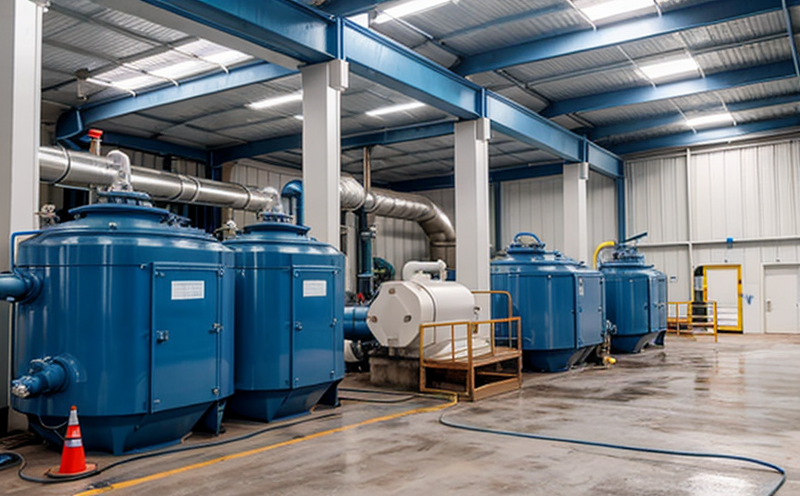ASTM E2317 Microbial Inactivation Testing in Ballast Water
The International Maritime Organization (IMO) and other maritime regulatory bodies have implemented stringent requirements to mitigate the spread of harmful aquatic organisms via ballast water. ASTM E2317 is a critical test method that ensures compliance with these regulations by assessing the microbial inactivation capability of ballast water treatment systems.
The primary aim of this testing procedure is to determine whether a system can effectively eliminate or significantly reduce pathogenic and opportunistic microorganisms, such as bacteria, fungi, and viruses. The test evaluates the efficiency of biocides, physical barriers, and other treatment methods employed in ballast water systems.
During ASTM E2317 testing, treated ballast water is inoculated with a standardized mix of microorganisms, which are then exposed to the system's treatment method. The effectiveness of microbial inactivation is quantified by measuring the reduction in viable counts or the complete elimination of specific pathogens.
The test requires precise control over environmental conditions such as temperature, pH levels, and exposure time to ensure accurate results. Specimen preparation involves careful dilution and inoculation techniques to achieve a consistent challenge for the system under examination. The use of ISO 16540-2 or ASTM D7892 compliant standards ensures reproducibility and comparability across different testing facilities.
ASTM E2317 is particularly important in the context of ship construction, maintenance, and decommissioning processes where compliance with maritime regulations is paramount. It helps shipyards, operators, and manufacturers ensure that their systems meet the stringent requirements set by authorities such as the US Coast Guard (USCG) and the European Union.
The test procedure typically involves several stages: preparation of inoculated samples, treatment of these samples with the system under evaluation, incubation to allow for microbial activity, and finally, enumeration or detection methods to assess survival rates. This comprehensive approach ensures that all potential vectors for biofouling are accounted for.
Understanding the nuances of ASTM E2317 is essential for quality managers, compliance officers, R&D engineers, and procurement teams involved in the maritime industry. Compliance with this standard not only enhances operational efficiency but also protects aquatic ecosystems from invasive species and pathogens.
Industry Applications
| Application Area | Description |
|---|---|
| Shipbuilders and Ship Operators | Ensure compliance with IMO regulations and avoid penalties. |
| R&D Engineers | Evaluate the efficacy of new treatment technologies. |
| Regulatory Bodies | Verify that ballast water systems meet regulatory standards. |
| Environmental Agencies | Monitor the impact of treated ballast water on aquatic life. |
| Insurance Companies | Evaluate risk associated with potential biofouling issues. |
| Shipyards and Maintenance Facilities | Ensure ongoing compliance during maintenance cycles. |
Eurolab Advantages
Eurolab, as a leading authority in marine and ship equipment testing, offers unparalleled expertise in ASTM E2317 compliance. Our state-of-the-art facilities provide the necessary precision and reproducibility required for accurate microbial inactivation testing.
Our team of certified technicians ensures that all tests are conducted according to international standards, ensuring reliability and consistency in results. We offer a range of services tailored to meet the specific needs of our clients, including comprehensive reports and expert analysis.
Eurolab's commitment to quality is reflected in our ISO/IEC 17025 accreditation, which guarantees that all testing processes adhere to stringent quality assurance protocols. Our advanced instrumentation and methodologies ensure that we can handle even the most challenging samples with precision.
By choosing Eurolab for your ASTM E2317 testing needs, you gain access to a wealth of experience and cutting-edge technology. This allows you to make informed decisions regarding compliance and operational efficiency, thereby minimizing risks and enhancing performance.
International Acceptance and Recognition
The ASTM E2317 standard is widely recognized by international regulatory bodies and maritime organizations. Compliance with this standard is essential for shipbuilders, operators, and manufacturers aiming to meet global environmental standards.
The US Coast Guard, European Union, and other maritime authorities have made compliance with ASTM E2317 a mandatory requirement for ballast water treatment systems. This ensures that all vessels entering international waters are equipped with systems capable of effectively reducing harmful microorganisms in their ballast water.
International acceptance extends beyond regulatory compliance; it also enhances the reputation and marketability of compliant entities. Ship operators who demonstrate adherence to these standards can gain a competitive edge by showcasing their commitment to environmental stewardship.
Eurolab's expertise in ASTM E2317 testing aligns with global trends towards stricter maritime regulations and increased focus on sustainable practices. By leveraging our services, clients ensure that they are at the forefront of this movement, contributing positively to marine ecosystems worldwide.





